Blog Short #190: My Summer Reading List: 6 Instructive Books That Make Life Better

Photo by amenic181, Courtesy of iStock Photo
It’s that time of year again. School’s out in most states, and it’s warming up! But that doesn’t mean learning should come to a halt for several months. Learning is great all year round. And it’s fun to choose what you want to learn, which is what summer reading is all about.
Here’s my recommended list of the top six books I’ve read this year. They’re all awesome!
Two of them will enhance your communication skills, one will help you deal with regret, and another will tell you all you need to know about how your memory works and how to protect it. Then there’s a book to make your marriage and relationships hum, and finally, one that will put your ego on red alert and show you how to get around it. If you’re an entrepreneur, business owner, or trying to master a skill, you’ll love that last one.
Let’s get to it!
1. Supercommunicators by Charles Duhigg
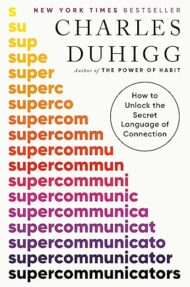 First up is Charles Duhigg’s Supercommunicators, a super-read and one of the most comprehensive books on communication I’ve encountered.
First up is Charles Duhigg’s Supercommunicators, a super-read and one of the most comprehensive books on communication I’ve encountered.
A central premise of the book is that most problematic conversations occur because you aren’t engaging in the same type of conversation as the other person. Duhigg describes three conversation categories that require different types of focus and responses.
Additionally, he describes the neurological workings of the brain when conversing, which gives you some inside information about what parts of the brain are used for different types of conversations and especially what role emotions play.
He emphasizes and teaches you how to listen actively, read body language, use storytelling, show empathy, and recognize what the other person wants from a conversation as you talk to them. That’s really helpful!
He also provides some great strategies for conflict situations. He offers many real-life examples to illustrate the concepts, which makes the information easy to assimilate and relate to.
The best thing is that you can apply the information for interpersonal conversations, work and professional interactions, and written communication. If you read this book, you will undoubtedly improve your communication skills and make better connections with people.
2. Remember by Lisa Genova
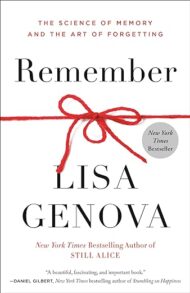 Remember by Lisa Genova is an all-in-one treatise on how memory works, how to improve and protect it, and when and why it’s faulty.
Remember by Lisa Genova is an all-in-one treatise on how memory works, how to improve and protect it, and when and why it’s faulty.
If you worry about how good your memory is or have concerns about forgetfulness, you will love this book!
Genova begins with a detailed description of how memories are formed and the four steps necessary to make and store a memory. She then provides an easy-to-understand sketch of the parts of the brain used in memory-making so you can almost visualize the process.
Next, she describes the elements that cause people to remember some things and not others and provides specific, concrete strategies for increasing memory retention. I loved this section!
Finally, Genova discusses how memory changes with aging, why this happens neurologically, and what you can do to slow it down. Most people don’t realize that memory begins to slow much earlier in life than they might think, and preserving it should also begin early. Her strategies are completely doable.
I highly recommend this book so you can begin preserving your memory immediately!
3. Rapport by Emily Alison & Laurence Alison
 Rapport is our second book on communication. The authors are both well-known forensic psychologists who participated in developing a “model of rapport” based on over 2,000 law enforcement interviews. Their book is the result of this endeavor and lays out their model.
Rapport is our second book on communication. The authors are both well-known forensic psychologists who participated in developing a “model of rapport” based on over 2,000 law enforcement interviews. Their book is the result of this endeavor and lays out their model.
The book’s theme is that rapport building is the essential activity underlying good communication. You build rapport by making an authentic connection with another person through listening and seeking to understand.
Their model includes four foundations, which they refer to as the HEAR method. HEAR stands for: Honesty – Empathy – Autonomy – Reflection.
Each of these elements is described in detail and illustrated with real-life examples. Most fascinating are some of the author’s interviews with terrorists, where they used these foundational practices to elicit information without being manipulative or using trickery.
In addition to the four foundations, the authors describe four communication styles using animal avatars. These are:
- T-Rex
- Mouse
- Lion
- Monkey
They provide full descriptions and show you how to identify which style someone is using in a conversation, giving you insights into how to respond. This schematic is invaluable for increasing receptivity on both sides of a conversation.
The book is fascinating and informative. It offers numerous strategies for building rapport, honing communication skills, and remaining authentic as you engage.
4. The Love Prescription by John Gottman & Julie Gottman
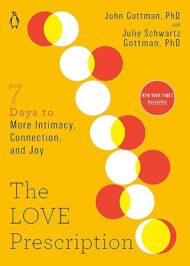 The Love Prescription is the newest book by husband-and-wife team John Gottman, Ph.D., and Julie Gottman, Ph.D. The title is apt because it outlines a roadmap to improving your marriage (or intimate relationship) with concrete, specific actions based on proven research.
The Love Prescription is the newest book by husband-and-wife team John Gottman, Ph.D., and Julie Gottman, Ph.D. The title is apt because it outlines a roadmap to improving your marriage (or intimate relationship) with concrete, specific actions based on proven research.
The authors walk you through seven strategies for deepening and maintaining your relationships. The steps are thoroughly elucidated and include examples of research done by them and others in their research lab, “The Love Lab.”
They tell you what to do and how and when to do it. They also tell you what not to do and why.
The fun part is that they use specific couples to illustrate their points and refer to them throughout the book. It’s like an inside peek at a marriage and seeing how a couple navigates precarious issues. The stories have a before-and-after feel, which is most helpful because you can see the strategies in action.
I would read any book by the Gottmans and have read several, but I love the prescriptive nature of this book and was able to apply the strategies quickly myself and see results. If you’re in a relationship or want to be in one, this book is a gem.
5. The Ego is the Enemy by Ryan Holiday
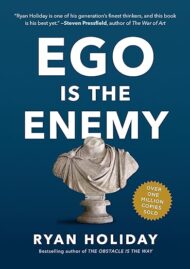 I’ll start with an opening statement that pulls you right into the message of this book. The author says:
I’ll start with an opening statement that pulls you right into the message of this book. The author says:
“Wherever you are and whatever you’re doing, your worst enemy already lives inside you: your ego.”
From there, he goes on to explain that our egos are mostly concerned with an “unhealthy belief in our own importance” which he describes as “arrogance and self-centered ambition.”
You get the gist! The rest of the book explains the various mechanisms the ego uses to thwart living by your principles, mastering something meaningful, and working to reach goals that reflect your core values.
Holiday says that we go through three stages when seeking to reach a goal or do something of value. These are:
- Aspire – feel inspired
- Succeed – meet with success
- Fail – fail to stay there
He provides numerous real-life examples of people going through these cycles and how some have allowed the ego to thwart their progress, self-destructing in some cases. Then there are others who have successfully circumvented the ego through cultivating humility, rational determination, practice, seeking mastery instead of accolades, and using failures to improve.
Most importantly, this book shows you all the ways you get in your own way when you’re trying to accomplish or achieve something, and it does it so very well.
If you’ve ever read anything by Steven Pressfield (The War of Art), you will love this book. It gives you tools to help you keep your ego in check as you seek to succeed in whatever endeavor you desire. And in the process, make a solid contribution to humanity. I can’t recommend this book more highly!
6. The Power of Regret by Daniel Pink
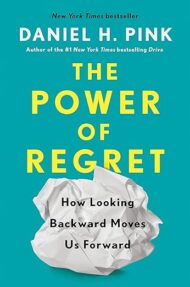 We live in a culture that promotes optimism and positive thinking, both of which have proven results. However, negative emotions are necessary and have value.
We live in a culture that promotes optimism and positive thinking, both of which have proven results. However, negative emotions are necessary and have value.
Daniel Pink points out that regret is one of the most powerful negative emotions and an essential one because it helps us survive.
Used correctly, regret is instructive and “makes us better.” It’s a catalyst for change.
Pink takes us through the causes of regret and how we experience it. He identifies four categories of regret:
- Foundation regrets
- Boldness regrets
- Moral regrets
- Connection regrets
This categorization helps you understand more clearly what you regret and what areas of your life you need to work on.
Pink then offers strategies to help you deal with and process regrets. This part of the book is extremely beneficial. He takes you through the process of coming to terms with your regrets, making amends if possible, and learning from them. Finally, he tells you how to move forward from them.
The Power of Regret is a must-read book because all of us have regrets, and left unprocessed, regrets can cause long-term suffering. It’s impossible to sail through life without them, but fortunately, we can grow from them, and this book shows you how to do that.
Ta Da!
So there you have my list. I would be most interested in any books you’ve read that you would recommend. Please email me your list! I’m always looking for new books and information, and I’d also like to know what you’d like to hear more about.
That’s all for today!
Stay in the shade!
All my best,
Barbara